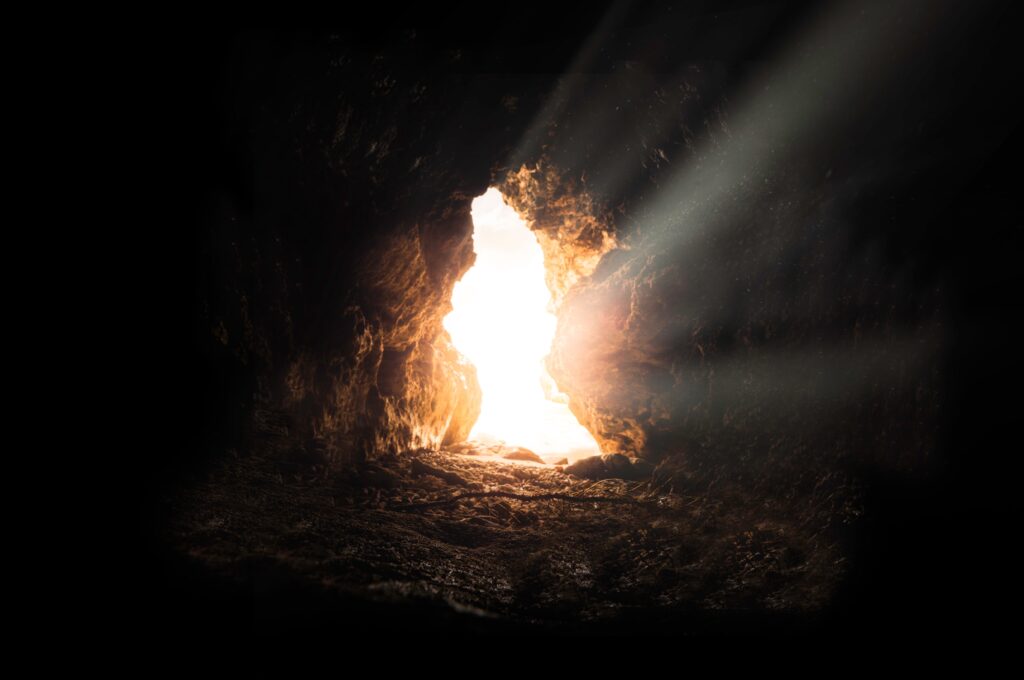Happy Easter! It’s good to say that – to people, from a pulpit on Easter Sunday, rather than into a camera live streaming it without any idea who’s “tuning in.” I’ve been reflecting throughout Lent on what this Easter might be like, or feel like, after last year. It was and continues to be such an unprecedented time that it is hard to put into words. That’s when a commercial came on the other night that seemed appropriate. I’m sure many of you have seen it, it’s been on for the last couple of weeks, from the food delivery service Uber Eats with former Saturday Night Live cast member Leslie Jones. It opens with her having “loaded tots” delivered as she sits down to watch March Madness. When all of a sudden a second “Leslie Jones” appears who seems transported from 2020. She perfectly captures 2020: she is completely disheveled – hair all over the place, in her pajamas banging on a piano. She turns to present-day Leslie Jones and says “I think you better double them tots…” Where present-day Leslie says “No – this me was last year.” To which 2020 Leslie Jones snaps back, “I didn’t get my madness last year, so WE’RE doing double this year…” as she sits down at the couch with her. Present-day Leslie Jones looks with horror as she says, “You are a mess” to which her former self yells “EVERYBODY WAS A MESS.”
Thanks so much for stopping by to read this, my homily for EASTER SUNDAY: THE RESURRECTION OF THE LORD JESUS CHRIST – April 4, 2021, for sharing it on your social media posts and your feedback and comments! For the audio version you can get them at SOUNDCLOUD click HERE or from ITUNES as a podcast HERE. Thanks again… I hope you and yours experience all of God’s blessings today and always! In Christ – Father Jim
Could not have imagined Leslie Jones and Uber Eats being in an Easter Homily together – so yeah, continued unprecedented times. Probably why the commercial works is that, in a humorous way, it kind of touches on a lot of things we can probably all relate to. There’s that sense of built-up emotion after a year where not just basketball’s March Madness was canceled, but far more personal things like weddings, graduation parties, birthday celebrations. Even more challenging, was the equally important and more gut-wrenching distance we felt not being able to gather together to grieve and mourn for loved ones lost. Those who suffered illnesses – whether they were physical, emotional, or spiritual . . . Those who lost jobs, businesses, and livelihoods. Those who lost loved ones and lives. They say that comedy is the funniest when there’s an element of truth to it. Everybody was a mess.
Everybody is a mess.
This is why Easter is so essential for us.
Despite the joy of this day, the victory, the triumph, the unprecedented, universe and history-changing event that is experienced as Jesus Christ who was crucified on Good Friday is risen from the dead . . . This is not a happy ending to a story. Jesus’ resurrection doesn’t mind-erase the horrors of the events of Holy Week. His experiencing new, transformed, glorious life doesn’t dismiss the betrayals, the denials, the failures of those who were closest to Him. They don’t make the heartache, broken spirits of Jesus’ mother Mary – who witnessed this unimaginable torment disappear – as if they had never happened. In fact, one of the amazing things in this Easter Gospel is that it is still dark . . . they are still walking in the fog of the horrors of Good Friday and the emptiness and silence of Holy Saturday as Easter first dawns. They are heading to the place where the finality of death seems to reign – to the tomb. And we don’t hear a word from the Risen Christ in this Gospel account – in fact, He’s not witnessed in His Resurrected body at all (at this point in the Gospel of John). All we have is the empty tomb.
If anything we’ve hopefully learned over the last year, it’s to appreciate the simple things – and what is most important. For Mary of Magdala – whose life before she had ever met or known Jesus was filled with demons that had tormented her both just from living life in a broken, sinful world as well as in her very body and soul in which she needed to be exorcized of them, which is what happens when she first meets Jesus. She knew what it was like for her life to have been a mess. For Simon Peter – the impulsive fisherman whose heart is so often in the right place, but whose mind and mouth trip him up over and over again – up until just a few days earlier where he experiences the most intimate and sacred of moments with Jesus at the Last Supper – having his feet washed by Him, being made into a priest of Jesus Christ and experiencing the Eucharist for the first time . . . moments later, when Jesus asks him to stay with him, to keep watch and pray in Gethsemane, he falls asleep . . . When Jesus is arrested, he reverts back to his hot-headed ways and grabs a sword and slices a guards servant’s ear off (such that Jesus in the midst of his passion has to pause, miraculously heal this man and fraternally correct Peter, again) . . . and worst of all, as the trial unfolds, and Jesus is being unjustly accused and condemned, Peter denies even knowing Him. Peter . . . Peter didn’t just know how life was a mess before Jesus. For him, it still was.
In that space of those days in between Good Friday and Easter Sunday, it’s hard to know exactly what they thought or felt. And from the little bits and pieces we glean from the Gospels, we learn that they aren’t joyfully anticipating anything. The darkness and madness of the world of Good Friday followed by the silence of death in a cemetery has a chilling effect on even the strongest and most faithful of hearts. Which is why the empty tomb is so powerful. It asks an obvious question: Where is Jesus?
That’s a question many faithful have been asking. That’s a question that even those who aren’t necessarily believers but who are desperately looking for any answers to the darkness, the madness, the messiness of life ask of those who claim to be followers – Where is Jesus?

In the other three Gospels, the amazing story of Easter begins not with an appearance of the Risen Christ but with the empty tomb as well. But in the other accounts, they all share the details of the appearance of an angel who greets the perplexed visitors to the tomb. In the Gospel of Matthew, the angel says, “you seek Jesus of Nazareth, the crucified. He has been raised; He is not here . . . He has been raised, exactly as promised.”
We look for, we want, maybe we even expect that we would find Jesus protecting us from getting COVID-19 . . . or that the loved ones we prayed for wouldn’t have died . . . or somehow that He should show up by preventing and protecting us in countless ways. Yet that’s never been our story. With the gift of free-will, which makes us not simply creatures who operate in some pre-defined, expected way but made in the likeness and goodness of God’s own image, He makes it possible for us to choose whether or not to allow Him to work with and within us. He’s constantly inviting us to look at the realities of our world, our lives – to look at our messes and confront the choice to continue to remain in them, or choose to step into faith. To hear that call within… that desire to find Jesus. To step out in faith, in the darkness, in our mixed, conflicted, and confused feelings to pursue Him. To have eyes of faith who recognize right there in the midst of that place of death how life has changed for Jesus and how it is possible for us to experience that new life as well. To see Jesus, lain not in the stories of death and destruction, but at work – in the dedication of strangers who work in the midst of those experiences in acts of selflessness, healing, and comfort . . . To realize Jesus is not going to be found in the despair, and frustrations, and angry voices continuing to try to divide and manipulate and sow fear – but is very much at work in those who are ambassadors of His mercy, of peace, and compassion.
The empty tomb is the ultimate promise of Hope . . . it is the eternal victory over death and the evil one . . . it is the invitation to experience and share the love of the Risen Christ. The empty tomb proclaims the potential for humanity to conquer those dark tendencies toward despair, isolation, and self-centeredness.
Let us take this opportunity – gathered here together as we could only imagine doing a year ago – to rededicate our lives to Christ. Jesus will never leave us, Jesus will never disappoint us. Jesus will never leave us to fend for ourselves in a world that, at times, scares us with its unpredictability and uncertainty. No matter what, we know that Jesus walks by our side, supporting us, remaining with us, whether in the isolation of quarantine or here today, gathered together as we are. Jesus’ triumph over death is not just His triumph, but ours, as well. The promise that a life lived in Christ and in His service will lead to our own resurrection, on the last day. That no matter how messy our lives might seem to us, God has the ability to take us as we are and lead us to a whole new level of joy and union with Him. And if we hesitate at the thought of that – thinking we are somehow undeserving or unworthy of His transformative love – we need only remember, how he worked with broken, imperfect people right from the beginning who testify that with God all things are possible. In the joy of the Risen Lord, gathered together as a community of believers, let me say once again. Happy Easter.












Nicely done, Father.
Thanks Mr. Epps!